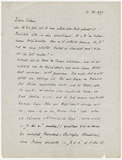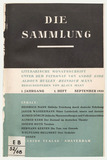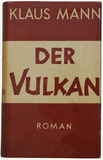Publishers
Eben für dieses verstoßne, für dieses zum Schweigen gebrachte, für dieses wirkliche Deutschland wollen wir eine Stätte der Sammlung sein.
[It is for the outcast, the forcibly silenced, the real Germany that we want to offer a place of gathering (ed. trans.)]
Klaus Mann, foreword to the first issue of the exile magazine Die Sammlung, published by Querido Verlag, September 1933
When the Nazis staged the book-burnings of 10 May 1933, the sent out an unequivocal message: they would decide in future what the German public should read and what not. Works by Jewish authors or those who were of a different mindset to the Nazis were to belong to the latter category. In order to institutionalise their absolute control over all of Germany’s cultural activities, the Nazis set up the Reichskulturkammer (Reich Chamber of Culture) in 1933. One of the organisations under its auspices was the Reichsschrifttumskammer (Reich Chamber of Literature), which was responsible for all professions to do with book publishing. Authors, publishers, book-sellers and librarians had to become a member if they wanted to continue working. This gave those in power the opportunity to issue working bans or to severely restrict freedoms. A Jewish publisher was only allowed to publish the works of Jewish writers and the sale of such books was subject to controls.
Many writers and publishers therefore already decided early on to leave Germany, mostly to enter other European countries. As such, the German-language exile section of the Querido publishing house in Amsterdam was established in July 1933 with former Kiepenheuer director of publishing Fritz Landshoff heading it. Until it was dissolved in 1940, Querido was one of the most important publishers of contemporary German-language literature in exile. German-language publishers were also established in Austria, Switzerland, France and Czechoslovakia and they published the works of authors who were banned in Germany.
The year 1940 saw a turning point caused by the War: because of advances by the German army, most of the European exile publishers had to cease their work. There were only a few individual attempts in the USA to publish German literature and it was mostly the authors who had to bear the financial risk in these cases. One of the few new publishers to be set up was Aurora Verlag, founded in 1944. Like the author-run publishing house El Libro Libre, which had been operating since 1942 in Mexico, Aurora released the works of its founding members.
Further reading:
Verlage im „Dritten Reich“, Saur, Klaus G. (Hrsg.), Frankfurt am Main: Klostermann 2013
Fischer, Ernst: Verleger, Buchhändler & Antiquare aus Deutschland und Österreich in der Emigration nach 1933: ein biographisches Handbuch, Elbingen: Verband Dt. Antiquare 2011
Shin, Jong-Rak: Selbstverlag im literarischen Leben des Exils in den Jahren 1933 – 1945: Autor, Verleger und Leser, Fuchstal: Sequenz 2008






